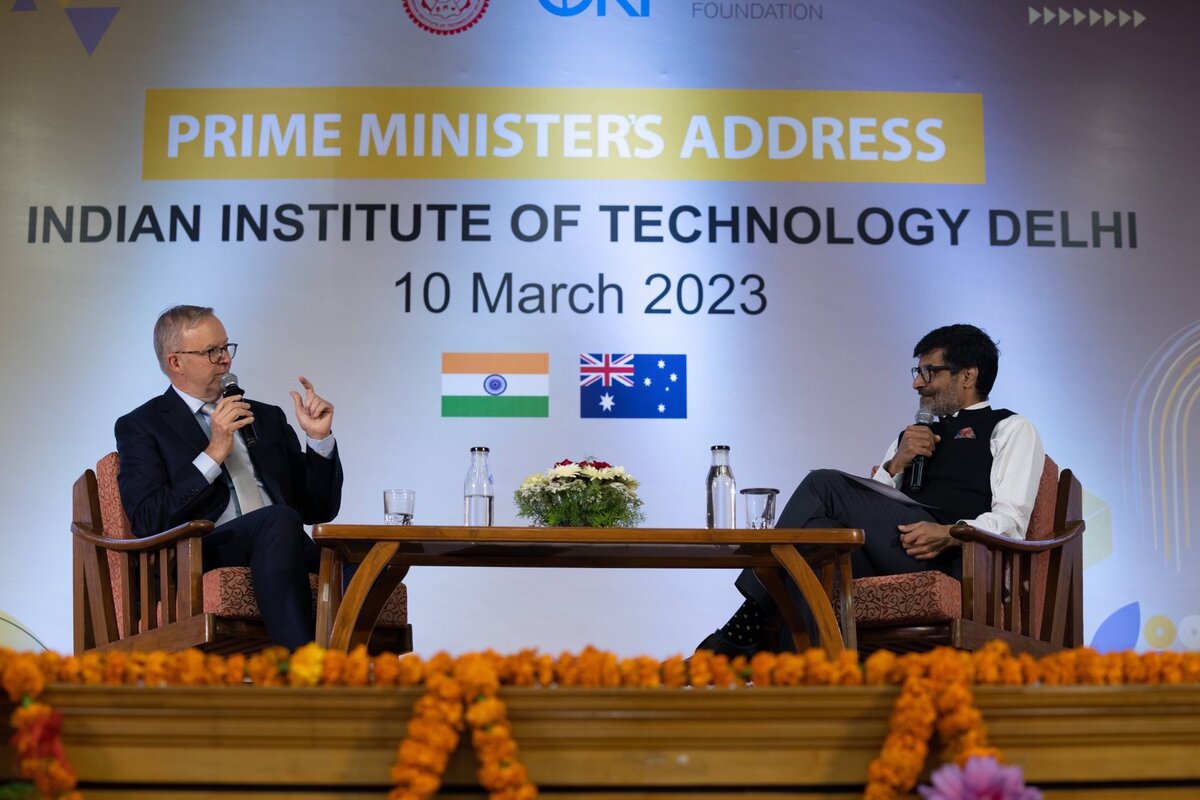Dronacharya Samman for top educators
Techno India Group hosted the Dronacharya Samman 2024, where they felicitated 500 outstanding educators across West Bengal for their contributions to school education.
On this occasion, the Australian Prime Minister witnessed some state-of-the-art technologies being developed by the IIT Delhi scientists.

Australian prime minister, Anthony Albanese addressing the gathering at IIT Delhi (Photo: Twitter/@AlboMP)
Australian prime minister, Anthony Albanese visited the Indian Institute of Technology Delhi (IITD) and addressed students, faculty and staff members and said that “education opens the doors of opportunity”.
Addressing the gathering at IIT Delhi, Albanese said, “It is such an honour to be here at what is not just one of India’s most prestigious centres of higher education … but a place of world renown, and one that is publicly run and funded.” “It was wonderful to meet with students and faculty from the Indian Institute of Technology in New Delhi this afternoon. Education opens the doors of opportunity, and the collaboration between Australia and India will be crucial to both our countries’ future,” he tweeted.
It was wonderful to meet with students and faculty from the Indian Institute of Technology in New Delhi this afternoon.
Advertisement
Education opens the doors of opportunity, and the collaboration between Australia and India will be crucial to both our countries' future. pic.twitter.com/6F3fqyy4Ur
— Anthony Albanese (@AlboMP) March 10, 2023
On this occasion, the Australian Prime Minister witnessed some state-of-the-art technologies being developed by the IIT Delhi scientists.
“It partly set the scene for this visit- a celebration of the close partnership between our nations. But this visit is also very much about the future. Because of our track record together, it’s a future I feel ambitious about. It’s an ambition backed by a keen awareness that we have so much to do.
I have been accompanied to India by more than 20 Australian business leaders from major companies. Among them are representatives from the transport, resources, finance, university, energy, architecture and design, health, commodities and information technology sectors. They have briefed me on the fruitful discussions they have had this week with Indian counterparts as part of the Australia-India CEO Forum, and the opportunities for deepening cooperation. I’m also pleased to say negotiations are underway for a full Comprehensive Economic Cooperation Agreement – one that will open access even further,” said Albanese.
He also announced the appointment of Tim Thomas as the inaugural chief executive officer of the centre for Australia-India relations.
“I’d like to take this opportunity to announce the appointment of Tim Thomas as the inaugural Chief Executive Officer of the Centre for Australia-India Relations. The Centre, which will open later this year, will work across government, industry, academia and community to build greater understanding of the Australia-India relationship and support opportunities that arise flowing from our growing connections,” said the Australian PM.
Albanese also hoped to see growing numbers of Australian and Indian students having the experiences of living and studying in respective countries – and to bring those experiences home.
“see growing numbers of Australian and Indian students having the experiences of living and studying in our respective countries – and to bring those experiences home,” he said.
The Australian PM also raised the issue of India’s unique position to provide leadership in the Global South and mitigate climate challenges.
“In the face of a changing climate, both Australia and India have begun to heed such warnings with the seriousness they deserve. India is in a unique position to provide leadership in the Global South. There can be no solution to climate challenges without India being central to that. Australia will become a renewable energy superpower, given its location. India will be too, and therefore, there are great opportunities to collaborate and work together,” said Albanese.
“Prime Minister Narendra Modi’s remarkable goal for India to install 500 gigawatts of renewable energy capacity by 2030 will have a profound impact on the global energy transition. The global move to a clean energy economy is here. And it’s shifting gears – quickly. To get a sense of what is possible, look at what India has already achieved. Between 2018 and 2021, India increased solar generation by 31 terrawatt-hours. That’s enough power for 24.7 million Indians,” he added.
Advertisement